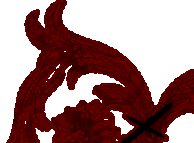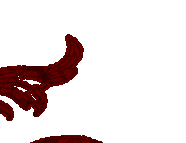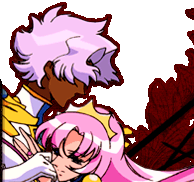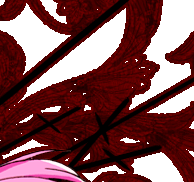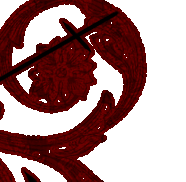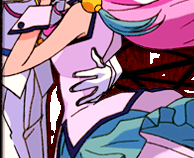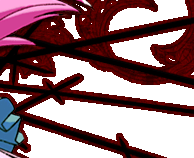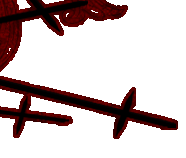
This analysis
was donated by Azusa
Kuraino .  Anthy
as Viewer's Mirror; or, Embracing Our Inner Anthies Anthy
has been interpreted by fans as everything from a literal witch
to a goddess, a faerie to an alien to an innocent girl whose fate
was
forced upon her. Watching fan reactions to the series, and specifically
to her character, is interesting because it generally reveals more
about
the fans than it does about Anthy. It is also interesting to me
because, several years after watching the show for the first time
(and
under very different circumstances than those which I first watched
it
under), I found myself thinking that Anthy was really the character
who
was the most like me, not Utena or Juri or any of the overtly rebellious
women the show gives us. (I'll let the reader decide what this reveals
about me, as I have no clue.)
I would respectfully submit that the character makes some viewers
(especially female ones) uncomfortable because she reminds them
of a
good many traits she would rather not confront in themselves, and/or
methods of resistance they almost wish they'd used in a world where
the
cards are already stacked against them by virtue of their gender. In ways, one could see her as Ikuhara's or Saito's attempt to force
viewers to confront their own internalized double standards. When
Akio
(or Touga) manipulates, deceives, and leads people on, and does
it all
so well, the fans eat it up, and enshrine him as a sex icon. (Not
to
say he isn't or wasn't meant to be, but I digress.) When Anthy does
the
same thing on a lesser scale, fans call her a bitch, a slut, an
unsympathetic character— essentially, the 'witch' that those who
betrayed her accused her of being, and which Utena fiercely insists
she
is not. A case of fans missing the point, or are we meant to have
to
confront our double standards by our reaction to her? Anthy may seem to be the antithesis of a feminist icon, the passive,
smiling Stepford Wife-like Rose Bride, who lets the man (men) in
her
lives use her in every way, including for sex. On another level,
she
displays the only form of resistance which is possible for a woman
in
her (hardly unprecedented) situation: she gains a form of control
over
the man who dominates her by making sure he becomes dependant on
her,
and making it clear to him that not only does she not need him in
the
same way he needs her, but that she won't always come through for
support. Like many wives from time immemorial, she has to listen
to him
rattle off his list of sexual conquests, and then come back to her
in
the end when he wants someone who's guaranteed to have no resistance.
Both of them know that, despite his philandering ways, at the end
of the
day, Akio still needs her more than she needs him. Utena is classified superficially as a shoujo series because
of its focus on relationships and romance, but unlike in more conventional
series such as Sailor Moon or Fushigi Yuugi, the
protagonists are not meant to embody specific virtues, and not only
do trusting innocence, love and faith in others' essential goodness
not always carry the day, those who are too innocent and trusting
suffer for it, becoming the exploited pawns of others. In this way,
it is much more reflective of the real world than the typical 'love
conquers all' shoujo outlook. Utena is not really a shoujo
series in the traditional sense, although it masquerades as one;
it defies attempts at simple categorization. It similarly defies
attempts at easy analysis, even of its bit players; seemingly invites
viewers to find allegory, but gives them no constant symbols to
work with. In the end, as with the character of Anthy herself, few
fans seem to be content to take it at face value, without searching
for meaning that isn't. One of the more unusual aspects of her character is that, unlike
any
other character in Utena, she seems to shift drastically in age
and
appearance, going from a small petite schoolgirl in a uniform (when
she's in classes with Utena and Wakaba) to a very mature and voluptuous
woman (when having her liasons with her brother). Are we supposed
to
conclude that one of her many faces is the 'real' Anthy, and the
others
an illusion or glamour? Putting aside the unresolved (and probably
unresolvable) arguments about whether Anthy is really a witch or
not,
whether her power consists of anything other than her emotional
significance to the people in her life, and whether indeed anything
we
see in the show is meant to be objectively real, I think that instead
the viewer is being shown Anthy as she appears to the other people
in
her life: she becomes a mirror not just for the viewer's attitudes
towards her, but for those of the people in her life as well. To
Utena,
she becomes an innocent and passive schoolgirl; to Akio, beautiful
and
coldly remote as a goddess. When we see Anthy standing with her
hair
down in the planetarium, appearing to glow with radiant light while
her
brother ogles her from the couch, we see her through his eyes, his
feelings about her translated into image: inhumanly beautiful and
actively dangerous. This is his image of her which maintains a hold
over him, as much as her own behavior does, and why he fears her.
Is it
reality? No, but neither is the small and passive schoolgirl seen
by
Utena. The one character in the series who is most humanly ambiguous
is
the one whom we are not allowed to see as she is, but only through
others' eyes. Anthy can be called the most realistic character in the series
for a
number of reasons. She does not blatantly embody a single virtue
or
vice, as many anime fans are used to seeing in their characters;
her
motivations are often confusing, and probably unclear even to her,
her
behavior a paradox. She has some clear virtues— her love and
compassion for animals, for instance— and a host of quirks which
make
her phenomenally confusing and difficult to live with; she swings
from
being remarkably childlike to displaying a very aged cynicism and
sexual
behavior which would be expected of a much older woman; she makes
mistakes, sometimes very selfish and ignoble ones; she is a curious
puzzle with no easy solution. She comes off as a human being dumped
into a shoujo universe where every character except her is a morality
play in miniature, and she, being human, has no clear 'message'
to
impart to viewers by her behavior or her life; she is what she is
and no
more. Whether her taking Dios away from the world which 'needed' him
was a
crime deserving of her ultimate fate is debatable. It is very difficult
to watch the scene without concluding that she harbored some selfish
motive and some malice towards the people who insisted on his help;
it
is also difficult for me to think that, even so, she wasn't delivering
a
well-deserved kick in the pants to a world which wanted someone
else to
be its savior rather than getting its own hands dirty, and to Dios
whose
excessive selflessness was literally killing him. In a way, Anthy
is
the antithesis of the typical shoujo heroine, in that not only are
selflessness and blind trust not among her virtues, but she works
actively to divest her brother (a male martyr for once) of these
traits,
seeing they will bring him no reward in the end, and forcibly confines
him when he just won't stop. In most shoujo series, virtue is its
own
reward; in Utena, an excess of virtue is crippling. For an audience
probably used to seeing love and friendship carry the day— and
indeed,
the beginning of Utena leads the viewer on somewhat, by playing
up
Utena's nobility and her compassion for Anthy, to think that this
will
be the same case— Anthy's all-too-human selfishness, jealousy and
bitterness may seem completely morally unacceptable at first glance,
never mind that most girls would have behaved much more like Anthy
than
like Sailor Moon in the same no-win situation. Of course, she is punished by a world which refuses to accept this
from
a woman, and perhaps she even saw her fate as an indication that
she was
right and the rest of the world was wrong. Witches cannot be
princesses, but princesses cannot save themselves. Having voluntarily
accepted a role, that of the 'witch,' which ensured her condemnation
by
society, she continues to rebel in her own ways. She does not accept
her new role as a glorified Stepford Wife with smiling grace as
her
penance, but merely endures it, and chafes against it at every
opportunity, though she perfects the blank smile. She allows herself
to
be overtly abused, but takes covert revenge against her tormentors—
her
brother by refusing to need him as much as he needs her, Kanae (who
hurts her more by being her brother's trophy than through any intrinsic
ill will) by refusing to show sisterly affection for her, and Nanami
and
her flunkies in... well, various ways— and likely enjoys doing
it.
This is taboo for most shoujo series, of course, but Anthy is a
human
dropped into a twisted shoujo universe (who wouldn't have thrilled
to
see the popular glamour-girl of the class, if they weren't one
themselves, miserable and angsting?). One of the things that seems to go over many viewers' heads, perhaps
simply through lack of life experience, is that some who suffer
voluntarily for whatever reason, when confronted by an outsider
insisting they don't deserve their fate, will often attempt to play
up
their worst and most malevolent traits in order to convince the
other—
and themselves— that they really deserve it; that they, without
this,
would be completely unsympathetic. Utena, not only by trying to
convince Anthy that she doesn't want or deserve to be the Rose Bride,
but by embodying the noble, hopeful innocence Anthy herself probably
had
at one point before she learned she could never be a princess, triggers
this reaction in her. The essential problem is that if Anthy could be convinced of her
self-worth, she would see not only the disgrace and futility of
her own
situation, but despair at the fact that she had no way to get out
of it.
Because she thinks she has no means of escape, she continues to
reinforce to herself the idea that she is the witch the world names
her;
if she allowed herself to confront the idea that she didn't deserve
this, it would magnify her own despair exponentially to see how
she was
trapped. Instead she allows herself to remain in her dysfunctional
relationship with her brother, with him needing her (though he abuses
her and calls himself the victim, as so many abusers do), nothing
changing. Akio tells her to stab Utena in the final episode, but
she
also does it of her own will, to reinforce to herself the idea that
there is and will never be any escape for her, that Utena was simply
too
naive and trusting to ever be her prince (although in her desperation
she adds insult to injury by telling Utena 'it's because you're
a
girl'— who -could- be her prince?; she's too cruel, too stained
and
dirty). She once saw the door before her, and now she sees it closing;
she shuts out all possibility that it could ever have been otherwise;
she wants to deny to herself that she ever could have cared for
Utena,
that her heart had been soft enough. Of course, because Anthy is not a typical heroine, her ultimate
'rescue'
is not a normal one either: although Utena shows her the way out,
it
remains her choice to take it, and ultimately, she rescues herself.
She
rejects the microcosm created by her brother, sees it as it is for
a
small, twisted power-play set against the scale of a much larger
world,
and finally turns her back on him. It may be difficult for viewers
who
have never been in a situation which they walked into voluntarily,
but
ended up trapping themselves in, which both tormented them and made
them
cruel, to understand how much courage it takes to turn around and
not
look back, and to trust that there is something better out there
for
them. Anthy's story is also the story of anyone who has ever been
in a
dead-end relationship, a bad friendship or peer group or family
situation, any situation in which they allowed themselves to be
confined
because they felt they deserved no better, where the only power
at their
disposal was manipulation and subterfuge. Because of this, she remains to me the essential heroine of the
series,
more so than Utena, who came in with intrinsic nobility but was
never
shown having to strive for it. Her situation does not change; Anthy's
does, and as a result of her own decision to turn away as much as
because of Utena's obstinate caring for her and refusal to accept
that
she deserves her role. Indeed, at the end we see their roles reversed
and Anthy, the more worldly and subtle of the two, setting out to
be the
one to rescue her prince, finding anew in herself the traits of
good
will, compassion and nobility, but having the experience to exercise
them with caution (and, the viewer is led to assume, will use them
to
find a similarly wiser-for-wear Utena). Having earlier secured her
own
unhappy fate, she now becomes her own redemption and her own saviour. The idea that Anthy is not ultimately an empowered heroine, but
simply a
cardboard subservient female, is one which is laughable to me. (Who
knew it was so simple? To just walk away, and not look back.) Akio,
unredeemed by all the innocent trust Utena vested in him, remains
at
large, but still gets his unorthodox comeuppance: with Anthy, the
center
of his game, having discarded her role as the Rose Bride and walked
out
on him, the implication seems to be that his other players will
one by
one follow suit, walking away from his manipulations, whether
figuratively or physically. Indeed, as Anthy departs from Ohtori
Academy to find Utena, we see that although only one person remembers
the girl who wanted to be a prince, Akio's power over the others
seems
to have lifted in portion: Kozue and Miki practice piano together,
Shiori follows Juri as a friend with no apparent ill will, no longer
bound by their obsessions and neuroses. With Anthy having finally
seen
the game for the illusion it is, the rest of Akio's world seems
inevitably bound to come falling down around him, exposing him for
a
deceiver, a fraud, and— most of all— helpless without her. The
revolution comes not by sword and fire, but simply through refusal
to
continue the masquerade. By making the choice to walk out on her
brother, it is in fact Anthy herself— inspired by Utena— who brings
the real revolution. If the one who had the most vested in her part
can
turn her back on the game, what reason is there for others not to
follow
her? Whether she employs it for good ends or ill, Anthy's real power
comes
from her acceptance of the darker parts of her own human nature,
and her
willingness to use them. She may smugly agree that they make her
a 'bad
person' who deserves her fate, a conniving witch, but she does not
deny
nor repress them. Though she only wields a sword once, she can arguably
be called the most powerful of the characters, through her ability
to
stir emotions in people by reflecting unabashedly their worst qualities
and to make others depend upon her. There is an undertone to Utena
which cannot really be called Machiavellian, but which makes it
clear to
us that there are cases in which the ends do justify the means:
the
characters who ultimately bring about the most change and liberation—
from major ones like Anthy to minor players like Ruka— often do
it by
highly unorthodox and manipulative means, but which nonetheless
succeed
in smacking other characters out of the navel-gazing status quo
of their
lives. Of course, manipulation won't get you everything in the Utena
world— the title character herself shows that dogged faith and
good will can have good ends (the events which lead to Anthy's release)
as well as bad (her betrayal by Akio)— but it can go a pretty long
way; and sometimes the only way to break free of manipulation is
to become a manipulator oneself. Yet even for that, I find it difficult
to see the series as cynical: one is left wondering if Anthy would
have had the strength to turn away from her brother if she had not
shared some of his more 'demonic' aspects. As I don't see Utena
as being really didactic in the traditional sense, I can't go so
far as to say that I think the message we as viewers are definitely
meant to take is that we should embrace both our inner Utena and
our inner Anthy, but I think without doubt on some level we are
being asked to question our own moral systems, to identify with
characters who embody often-denigrated qualities. "But was
that really a good idea?" asks the narrator, of young Utena's
desire to become a prince: and we are made to ponder this question
not because Utena is a girl, but because we are shown in no uncertain
terms that sometimes witches can get more done than princes can.
  |

